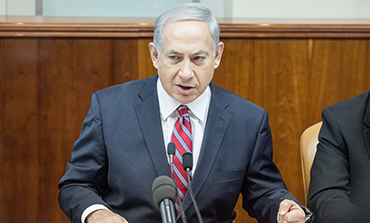PM: Iran’s stance on centrifuges means there can be no permanent accord
Netanyahu’s downbeat assessment of agreement reached in Geneva contrasts
with Kerry’s most recent appraisal.
 PM Netanyahu speaks at weekly cabinet meeting (photo credit: EMIL SALMAN/POOL)
PM Netanyahu speaks at weekly cabinet meeting (photo credit: EMIL SALMAN/POOL)